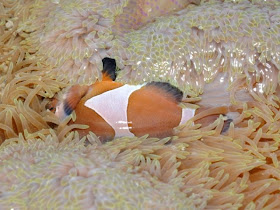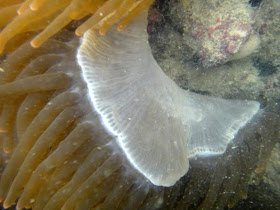 Unlike yesterday at Cyrene Reef, the weather was very kind to us today and we began the nem hunt by looking for the Edwardsid-looking anemone that we have been seeing at Hantu's high shores.
Unlike yesterday at Cyrene Reef, the weather was very kind to us today and we began the nem hunt by looking for the Edwardsid-looking anemone that we have been seeing at Hantu's high shores. Not too long, I stumbled upon this tiny anemone. It looked a little different from the usual ones that we have previously seen here. It has a plain oral disk and Dr Daphne later pointed out that this anemone has one bigger tentacle compared to the rest. This is quite intriuging!
Not too long, I stumbled upon this tiny anemone. It looked a little different from the usual ones that we have previously seen here. It has a plain oral disk and Dr Daphne later pointed out that this anemone has one bigger tentacle compared to the rest. This is quite intriuging! Here is another similar looking anemone that has shades of white and grey on its oral disk.
Here is another similar looking anemone that has shades of white and grey on its oral disk. This darker anemone is the usual ones that we have seen here before. These Edwardsids are not easy to collect though.
This darker anemone is the usual ones that we have seen here before. These Edwardsids are not easy to collect though. Pulau Hantu also has other sea anemones that are bigger and more colourful, such as this pair of Magnificent anemone (Heteractis magnifica).
Pulau Hantu also has other sea anemones that are bigger and more colourful, such as this pair of Magnificent anemone (Heteractis magnifica). There were also several Giant carpet anemones (Stichodactyla gigantea).
There were also several Giant carpet anemones (Stichodactyla gigantea). In one of them, a False clown anemonefish (Amphiprion ocellaris) was stranded on top of the tentacles of the Giant carpet anemone. I later guided poor fish back into the other parts of the anemone that has more water.
In one of them, a False clown anemonefish (Amphiprion ocellaris) was stranded on top of the tentacles of the Giant carpet anemone. I later guided poor fish back into the other parts of the anemone that has more water. At the reefy area, I came across two of these Bulb-tentacled anemones (Entacmea quadricolor).
At the reefy area, I came across two of these Bulb-tentacled anemones (Entacmea quadricolor). I also came across this huge sea anemone that looks fiery with their orangey-red tentacle colour.
I also came across this huge sea anemone that looks fiery with their orangey-red tentacle colour.  Here is a closer look at the tentacles of this sea anemone. I was not sure what it was exactly.
Here is a closer look at the tentacles of this sea anemone. I was not sure what it was exactly. Somehow when I took a photo of the body column of the anemone underwater, the tentacles do not look fiery orange in colour. Haha!
Somehow when I took a photo of the body column of the anemone underwater, the tentacles do not look fiery orange in colour. Haha!When I showed Dr Dahpne later photos of this sea anemone, we concluded that this is probably also the Magnificent anemone (Heteractis magnifica) as these anemones can come in different colour forms.
 I had a look at the reefy parts of Hantu as I was hoping to find the special Phyllodiscus sea anemone that Dr Daphne was sharing with us about. It is an anemone that can look like a soft coral, Acropora coral or even like seaweed or algae. As such, I looked more detailedly at the similar looking creatures such as this Asparagus soft coral (Family Nephtheidae).
I had a look at the reefy parts of Hantu as I was hoping to find the special Phyllodiscus sea anemone that Dr Daphne was sharing with us about. It is an anemone that can look like a soft coral, Acropora coral or even like seaweed or algae. As such, I looked more detailedly at the similar looking creatures such as this Asparagus soft coral (Family Nephtheidae). And also this Branched halymenia seaweed (Halymenia sp.).
And also this Branched halymenia seaweed (Halymenia sp.). The colony on the right is definitely a soft coral, not a special nem. And along the way, I saw lots of hard corals such as the mushroom corals- Long mushroom coral and Circular mushroom coral in this photo.
The colony on the right is definitely a soft coral, not a special nem. And along the way, I saw lots of hard corals such as the mushroom corals- Long mushroom coral and Circular mushroom coral in this photo. Looking like anemones, these are actually more hard corals- the Anemone corals (Goniopora sp.).
Looking like anemones, these are actually more hard corals- the Anemone corals (Goniopora sp.). There were also many of these bright green Corallimorphs (Order Corallimorpharia) that look like anemones.
There were also many of these bright green Corallimorphs (Order Corallimorpharia) that look like anemones.  There was a first sighting for me today- the Physogyra Coral (Physogyra sp.)!
There was a first sighting for me today- the Physogyra Coral (Physogyra sp.)! Physogyra species are very rarely encountered intertidally area in Singapore. These hard corals are unique in having large bubbles that obscure their skeleton. These are possibly modified tentacles that inflate during the day. The sacs contain symbiotic algae (zooxanthallae) and the expanded surface area probably helps increase photosynthesis activity.
Physogyra species are very rarely encountered intertidally area in Singapore. These hard corals are unique in having large bubbles that obscure their skeleton. These are possibly modified tentacles that inflate during the day. The sacs contain symbiotic algae (zooxanthallae) and the expanded surface area probably helps increase photosynthesis activity. Another organism with photosynthetic pigments would be this juvenile Fluted giant clam (Tridacna squamosa) found by James. It has been already tagged by Mei Lin's giant clam project.
Another organism with photosynthetic pigments would be this juvenile Fluted giant clam (Tridacna squamosa) found by James. It has been already tagged by Mei Lin's giant clam project.  To end this post, here is a nice sluggish find of the orange spotted Gymnodoris nudibranch (Gymnodoris rubropapulosa).
To end this post, here is a nice sluggish find of the orange spotted Gymnodoris nudibranch (Gymnodoris rubropapulosa).More photos of the trip here: http://www.flickr.com/photos/koksheng/archives/date-taken/2011/06/07/
No comments:
Post a Comment